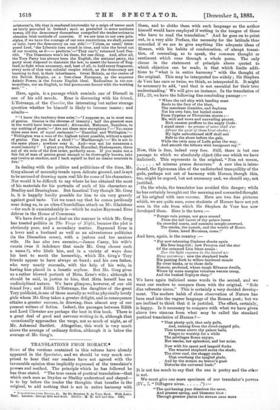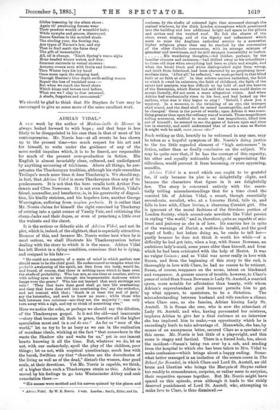TRANSLATIONS FROM HORACE.*
BOMB of the versions contained in this volume have already appeared in the Spectator, and we should be very much sur- prised to hear that our readers have not agreed with the favourable opinion thus implicitly expressed of the translator's powers and method. The principle which he has followed he has thus stated. "The true canon of poetical translation—that which such men as Dryden or Shelley understood and obeyed— is to lay before the reader the thoughts that breathe in the original, to add nothing that is not in entire harmony with
• Translations from Horace. ke. By Sir Stephen E. de Pere, Bart. With Latin Teat. London: George Bell and Sons. Dublin : H. H. Gill and Son. 1885.
them, and to clothe them with such language as the author himself would have employed if writing in the tongue of those who have to read the translation." And he goes on to point out, in a very able Preface, the necessity for the latitude thus conceded if we are to give anything like adequate ideas of Horace, with his habits of condensation, of abrupt transi- tion, of concealing, so to speak, the common thought or sentiment which runs through a whole poem. The only clause in the statement of principle above quoted to which objection can be made, is that which limits addi- tions to "what is in entire harmony" with the thought of the original. This may be interpreted too widely ; Sir Stephen de Vere has once or twice, we think, so interpreted it. It might be necessary to add, and that is not essential for their true
understanding.' We will give an instance. In the translation of 29, we have the following fine concluding passage :— " When the tall ship with bending mast
Reels to the fury of the blast, The merchant trembles, and deplores Not his own fate, but buried stores From Cyprian or Placenician shores ;— He, with sad vows and unavailing prayer, Rich ransom proffers to the angry Gods :
I stand erect : no groans of mine shall e'er
Affront the quiet of those blest abodes : My light nnburthened skiff shall sail Safe to the shore before the gale, While the twin sons of Leda point the way, And smooth the billows with benignant ray."
Now, this is free, indeed very free. Still, there is but one passage to which we absolutely object (the one which we have italicised). This represents in the original, "Non est menm, ad miseras preces decnrrere." A new idea is intro- duced, the Epicurean idea of the undisturbed tranquillity of the gods, perhaps not out of harmony with Horace, though this, too, might be argued, bat not necessary and, we should say, not justified.
On the whole, the translator has avoided this danger; while
he has certainly brought out the meaning and connected thought of his original with rare success. Here are two fine pictures which, we are quite sure, some students of Horace have not yet
seen in the ode from which Sir Stephen de Vere has now developed them. Here is the town :—
"Forego vain pomps, nor gaze around
From the tall turret of thy palace home On crowded marts, and summits temple-crowned, The smoke, the tumult, and the wealth of Rome. Come, loved Meecenas, come l"
And here, again, is the country .— "For now returning Cepheus shoots again
His fires long-hid ; now Procyon and the star Of the untamed Lion blaze amain :
Now the light vapours in the heated air Hang quivering : now the shepherd leads
His panting flock to willow-bordered meads By river banks, or to those dells Remote, profound, where rough Silvanue dwells, Where by mute margins voiceless waters creep, And the hushed Zephyrs sleep."
We have again italicised some words in the second, and we want our readers to compare them with the original. "Sole
dies referente siccos." This is certainly a very decided develop- ment. The modern habit of close observation of Nature has been read into the vaguer language of the Roman poet; but we are inclined to think that it is justified. The effect, certainly, is happy. Is it necessary to compare with what we have given above two stanzas from what may be called the standard poetical translation of Horace ?—
" That plenty quit, that only palls,
And, turning from the cloud-capped pile, That towers above thy palm:* halls, Forget to worship for a while The privileged Rome enjoys, Her smoke, her splendour, and her noise.
Now with his spent and languid flocks The wearied shepherd seeks the shade, The river cool, the shaggy rocks That overhang the tangled glade, And by the stream no breeze's gush Disturbs the universal hush."
It is not too much to say that the one is poetry and the other
is not.
We must give one more specimen of our translator's powers
(IV., 7, " Diffugere nives ,,)
"The quickening year dissolves the snow, And grasses spring, and blossoms blow : Through greener plains the stream once more Glides lessening by the silent shore : Again th' awakening forests wear Their pendent wealth of wreathed hair ; While nymphs and graces, disarrayed, Dance fearless in the mottled shade.
The circling year, the fleeting day, Are types of Nature's law, and say That to frail earth the fates deny The gift of immortality.
All, all is change. 'Neath Spring's warm sighs Hoar•headed winter wakes, and dies : Summer succeeds to vernal showers : Autumn comes next with fruits and flowers: Then Winter lays his icy band Once more upon the sleeping land.
Through Heaven's blue depth swift.sailing moons Repair the loss of vanished suns :— Bat when we reach the fated shore Which kings and heroes trod before, What are we ? clay to dust returned, A shade, forgotten and unmourned."
We should be glad to think that Sir Stephen de Vere may be encouraged to give us some more of the same excellent work.







































 Previous page
Previous page